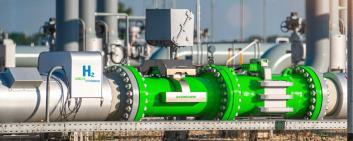This financing underlines the importance of industries that are all too often left out of conversations around cleantech and the climate.
Common investment topics included livestock and feed, crop inputs such as pesticides and fertilizers, precision agriculture and robotics, and alternative proteins.
Innovations in these fields can have a massive global impact given that agrifood systems – including farming, food processing, distribution, and consumption – are thought to account for over a third of total greenhouse gas emissions, in addition to being a significant cause of land and water degradation, deforestation, and biodiversity loss.
At the same time, food systems need to be able to continue producing enough to feed the world’s growing population, albeit more sustainably and efficiently.
The need to enhance global food security for a growing population, while making food systems more efficient and sustainable, is driving a global effort to deliver agrifood innovation at scale.
Animals: Aquaculture and livestock feed additives
Total VC investment in animal agtech has hit $863 million in 2023 to date.
Startups in the aquaculture subsector received just over $230 million for technologies ranging from IoT devices enabling more sustainable fish-farming, to novel feed products with enhanced nutrient properties, or made using sustainable ingredients.
Elsewhere, feed innovations aimed at land-based livestock have secured significant funding, raising $84.7 million so far this year.
Some noteworthy 2023 deals from the animal subsector included:
- eFishery (Indonesia), developer of technologies and services for fish and shrimp farms, raised $200 million in Series D funding from investors 500 Global, Kumpulan Wang Persaraan, responsability investment, Temasek, ADQ, 42X Fund, SoftBank Vision Fund, and Northstar Group.
- Ynsect (France), developer of bioconversion solutions using insects to make food products, animal feed, and organic fertilizers, raised $175 million in growth funding from undisclosed investors.
- CH4 Global (United States), producer of a seaweed-derived livestock feed supplement that reduces enteric methane emissions, raised $29 million in Series B funding to build and validate a production facility. Investors included DCVC Bio, DCVC Data Collective, and Cleveland Avenue.
Crop inputs: Fertilizers, pest control tools, and seed optimization
Total investment in crop input technologies has reached $746 million to date, covering fertilizers, seed coatings, and pest control products, among others.
Key deals in these subsectors have included:
- Atlas Agro (Switzerland), producer of sustainable nitrate-based fertilizers, raised $375 million in growth funding from Macquarie Asset Management to build industrial scale plants in the Americas.
- Enko Chem (United States), developer of a high throughput discovery platform to find alternatives to chemical pesticides and fertilizers, raised $80 million in Series C funding from Eight Roads Ventures, Nufarm, Endeavor8, and Akroyd.
- Aphea.Bio (Belgium), developer of sustainable crop inputs using natural microorganisms to increase yields and improve protection, raised $78 million funding to support pilot schemes. Investors in the Series C round included Innovation Industries, The Bill & Melinda Gates Foundation, Korys, SFPIM, BNP Paribas, ECBF Management, and Astanor Ventures.
Precision agriculture: Hardware and software for on-farm monitoring and optimization
The total investment across precision agriculture reached over $700 million as of the end of October. This category includes areas such as farm management software, soil monitoring, and robotics.
The most significant deals this year included:
- Ecorobotix (Switzerland), designer of crop-spraying robots, raised $52 million in growth funding to expand into new markets and build out its product range. AQTON, Cibus Capital, Swisscanto Invest, Yara Growth Ventures, Flexstone Partners, Swisscom Ventures, BASF Venture Capital, Verve Ventures, 4FOX Ventures, and Swiss Technology Fund were among the investors in the round.
- Agreena (Denmark), developer of platform that incentivizes farmers to switch to regenerative agriculture, raised $50 million in Series B funding to build out technological and financial services infrastructure. Investors included HV Capital, AENU, Anthemis Group, Kinnevik, Gullspang Re:Food, and Denmark's Export and Investment Fund.
- N-Drip (Israel), developer of smart irrigation systems, secured $44 million to fund its expansion in the United States and India. Investors included Granot Ventures, Natural Ventures, Metzerplas, Liechtenstein Group, Hamilton Lane, and Bridges Israel.
Alternative proteins: Cultivated, fermented, and plant-based substitutes for animal products
Alternative protein has been the most prominent agrifood cleantech investment topic for 2023 so far, though as the year draws to a close, the trend appears to be moving away from this area and toward on-farm categories.
Where the majority of investments in the subsectors mentioned above were late-stage rounds, alternative proteins saw a relatively even distribution of funding going to deals at seed, Series A, Series B, and above.
Alternative protein technologies including cultivated meat, plant-based proteins, and fermentation have received $762 million this year. Standout deals include:
- Bon Vivant (France), producer of animal-free dairy products using precision fermentation, closed a $15.9 million seed round to open a new lab in Lyon. Investors included Sofinnova Partners, Sparkfood, Captech Santé, Alliance for Impact, High Flyers Capital, Kima Ventures, Founders Future, and Picus Capital.
- Air Protein (United States), developer of a process for converting carbon dioxide to edible protein using single-celled organisms called hydrogenotrophs, raised $75 million for its Series B round. Ford Family Foundation, Barclays Corporate, ADM Ventures, and GV were among the backers.
- Umiami (France), developer of plant-based protein products focused on whole cuts, raised a $34 million Series A extension from Astanor Ventures, French Tech Seed, and Bpifrance.
While VC investment in cleantech startups has seen a steady decline over the last 18 months, investment in the agrifood category experienced a mini-boom in Q3 of 2023. It secured $1.5 billion in total funding, representing growth of 50% quarter-on-quarter, as an expanding group of investors recognize the need for innovation to manage the climate impact of food systems.







